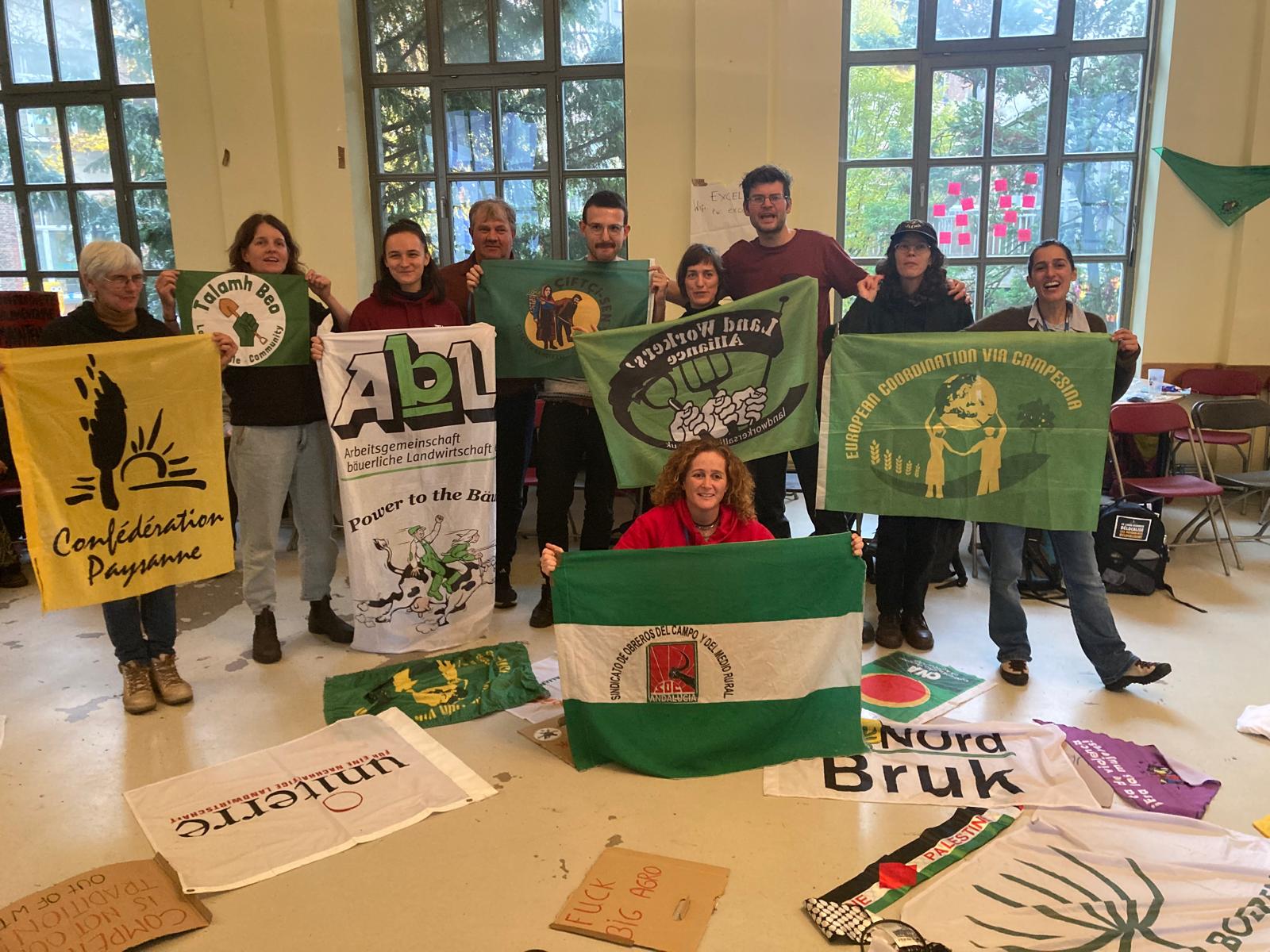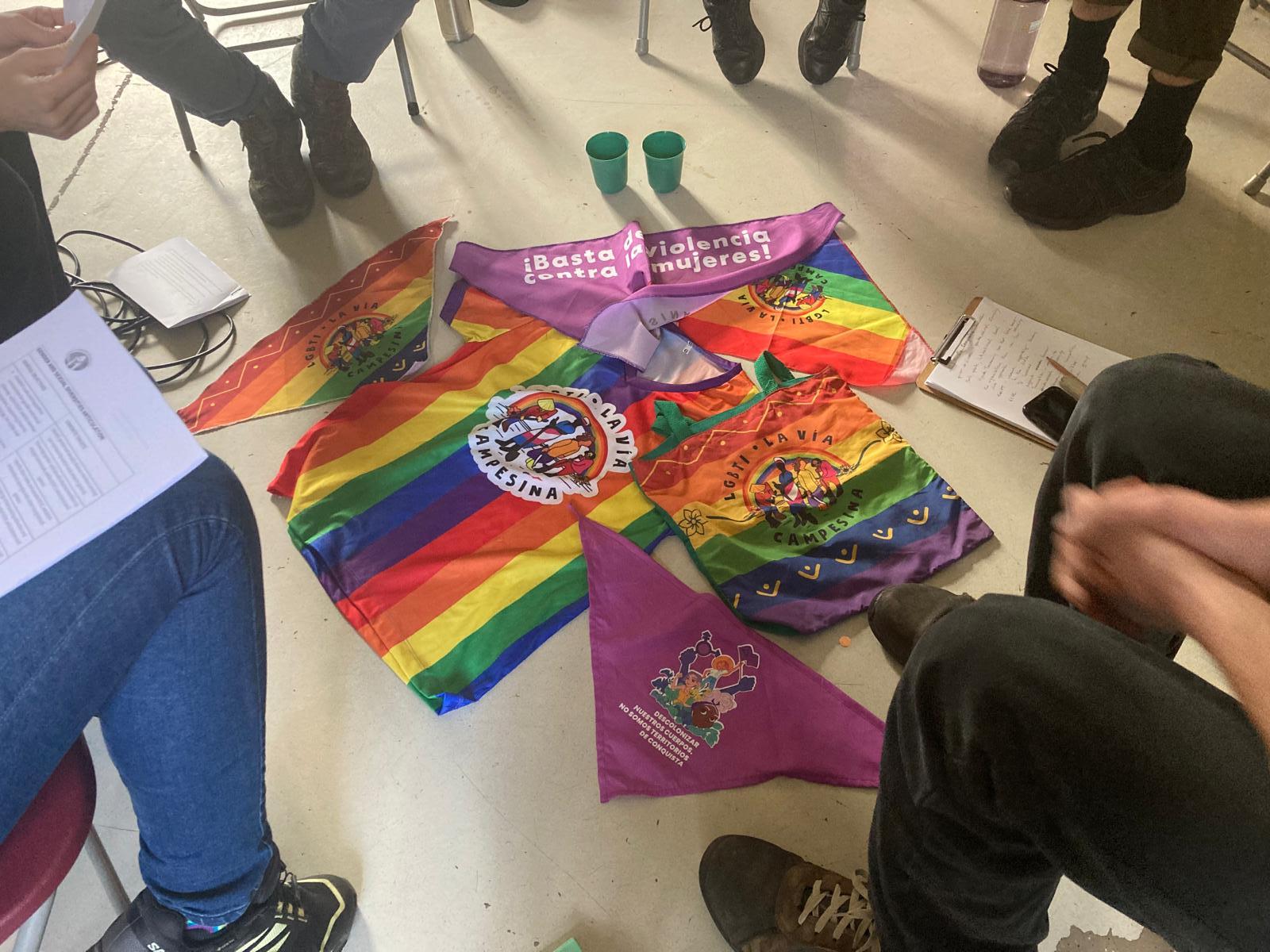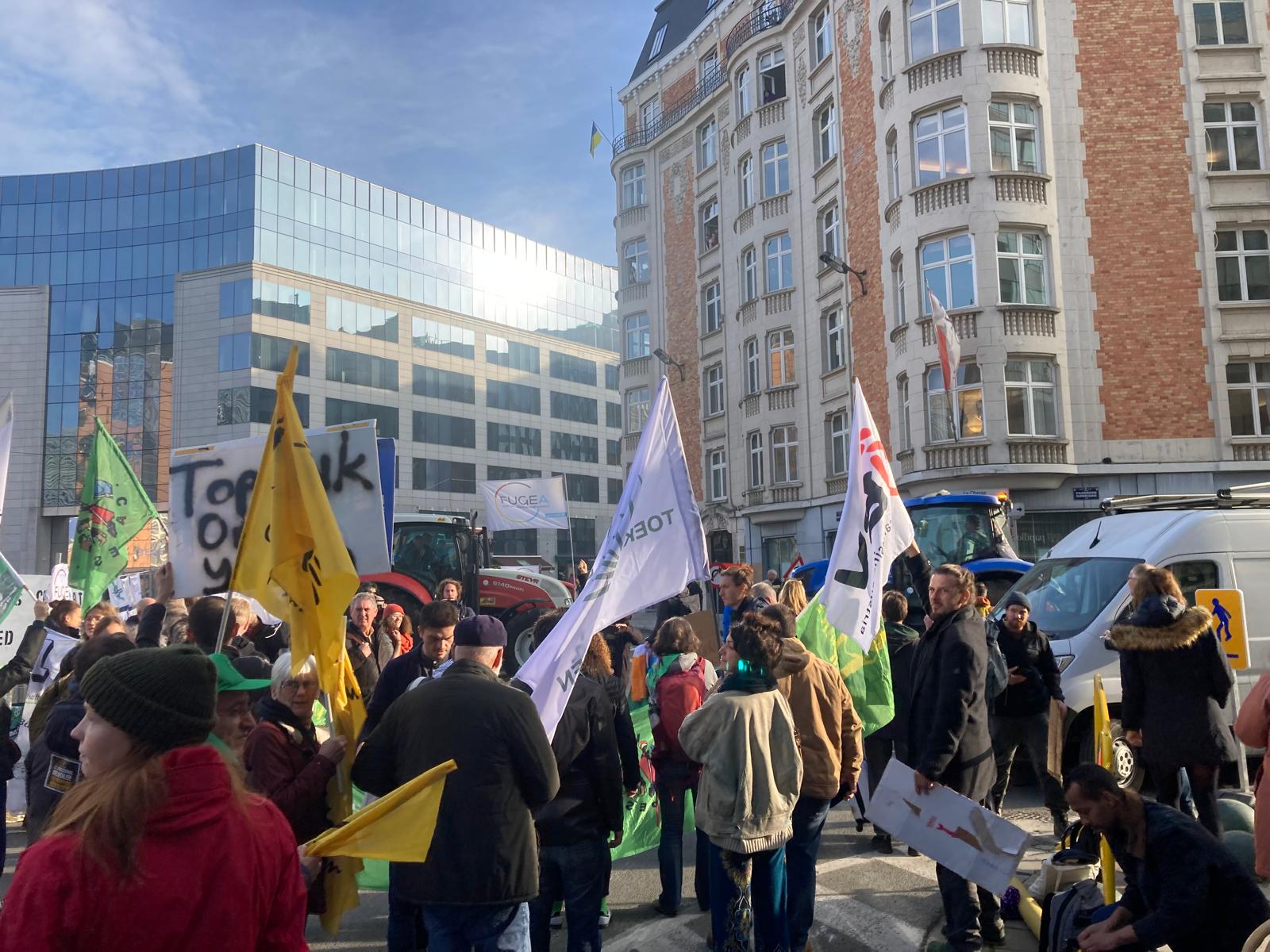In November 2024 LWA Coordinating Group member Roz Corbett and LWA Member Organiser Edwin Brooks attended the General Assembly of the European Coordination Via Campesina (ECVC) in Brussels. In this blog post they provide a bit of background about La Via Campesina’s European region, the work being done, and the inspiring time they had at the General Assembly.
The International Movement and Landworkers’ Alliance
While much of the work of Landworkers’ Alliance focuses on regional organising and local and national policy, we also exist as part of an incredible global movement; La Via Campesina (LVC). As a ‘movement of movements’ with over 200 million members La Via Campesina exists to uphold the rights of peasants and rural workers, to resist the power of the World Trade Organisation and international capitalism in our global food systems more generally, and to fight against the intersecting injustices that face peasants and food producers globally. The movement was instrumental in creating the UN Declaration on the Rights of Peasants and Workers in Rural Areas (UNDROP) and collectively created the concept of ‘Food Sovereignty’ to describe a world where communities are in control of food and resources to create agroecological solutions centred on social and environmental justice.
The European Coordination Via Campesina (ECVC) constitutes one of the ten global regions that make up the global movement. Landworker’s Alliance therefore engages with ECVC both as a way of connecting with our nearest geographical neighbours and sharing the struggle and as a democratic route into the global movement. La Via Campesina is founded on a grass roots system of participatory democracy. The Global Coordinating Committee is made up of one woman, one man and one youth from each region. Currently the General Coordinator of LVC is Morgan Ody, from ECVC, holding a role that rotates across the ten global regions over time.
The ECVC General Assembly 2024
From the moment we arrived in our hostel we began to renew connections made over the years, as well as make new friends. Delegates of the 27 organisations were in attendance from all the corners of the continent, each bringing unique perspectives of farming and rural life in their territories and the shared experience of life as a small farmer, forester or pastoralist in Europe.
The General Assembly opened with meetings of ECVC’s identity groups or ‘articulations’. These are ‘Women’, ‘Diverse Genders and Sexualities’, and ‘Youth’. These spaces were for really open discussions about what problems and challenges face the different groups in their landwork, and how members are organising to build solidarity in these groups.
In the ‘Diverse Genders and Sexualities’ group we talked about how members can face a lot of stigma in rural areas for having different genders and sexualities and how people often suppress this side of their life to be accepted into rural farming communities. We also had a deep conversation about intersectionality and how race, ethnicity and class affect landworkers across Europe and how ECVC can recognise these differences. There are no specific articulations for race, ethnicity and class in ECVC at present, and we discussed what options there might be to more clearly address these. With increasing far-right politics across Europe, making safe spaces and building solidarity and strong positions on intersectional power issues felt important.



The Women’s Articulation worked together to create a feminist analysis of the forthcoming EU Common Agricultural Policy (CAP) proposals, which will be developed over 2025. Now is the time to try and really amplify the positions of ECVC at the early stage of CAP development. There were lots of discussions about how the CAP is unfairly distributed in relation to gender, meaning that women generally get much less of the subsidy and this is an economic justice issue. We also talked about how the CAP is moving ever more towards competition in its ethos, and how that would increase food insecurity which is most likely to hit women and children first. We also talked about gender-based violence in rural areas and especially for migrant workers who are women or have other marginalised genders
The ECVC Youth Articulation meeting involved a mapping of different members upcoming events and a creation of a shared calendar. Discussion was also given to the forthcoming ECVC document on generational renewal in farming. It was really interesting to think about generational renewal against the backdrop of the UK’s agricultural property inheritance tax protests, as this is also ultimately a question about generational renewal. After the General Assembly, the work started in this meeting was continued when Ed met up with FLAME member Anna Goodman for a few days of dancing, eating, politics and laughter in a beautiful agroecological farm house in the south of Belgium!
After back to back General Assembly’s articulation meetings we all thought that another meeting was going to be impossible. Thankfully, instead we got out onto the streets for a demonstration about the trade deal between the EU and Mercosur – which is a trading bloc of South American countries. ECVC criticise this trade deal as it’s likely to push prices down for farmers in the EU, and the logic of increasing competition is likely to favour further intensification of farming in the EU and corporate interests. The protest was really positive, with lots of press attention, drawn in by the tractors. The press were interested to see farmers protesting with tractors but bringing a different perspective on the importance of market regulation, rather than asking for more deregulation as per some of the protests from farmers earlier this year; so it was good to show this diversity of opinion in the farming sector. Unfortunately at the time of publishing (several months later) the deal does look almost certain to go ahead, but still the struggle against free trade deals continues, and we in the UK need to take careful note of the impact of this deal as it unfolds.
The ECVC ‘Right to Land’ Working Group have been busy writing a forestry document, recognising the importance of an European-wide approach to forestry within LVC. Thanks to really excellent work by the forestry branch of the LWA we were able to input some important points into this discussion, and work will be ongoing on the forestry position into 2025.
Finally we discussed and ratified the ECVC policy on digitalisation in the farming sector, and had a broad ranging discussion about our position on technologies and how they impact farmer autonomy. This ended with a story from one of the Spanish members who had visited a big strawberry plantation in Andalucia where migrant workers have ankle tags to monitor their work performance and track them.
All in all it was an exhausting but really rewarding experience and it feels really important in increasingly divided times to find common ground and share our struggles internationally. Situating LWA in the context of a European and global movement makes the efforts we are making at home seem even more relevant. We both left Brussels feeling reenergised to continue the work and build the connections. Viva La Via Campesina! Globalise the Struggle, Globalise Hope!
Get involved!
For any members interested in getting more involved in ECVC work, there is always an enthusiasm for LWA members to join ECVC working groups and attend international gatherings. We may not be in the EU, but then the region is geographical rather than political, including countries like Georgia and Turkey, and there is still lots to learn from our different strategies and approaches to advocacy work, and always solidarity to be built between members.
The Women, Youth and Gender and Diverse Sexualities Articulations and the Right to Land Working Group (who are holding the forestry paper at the moment) are particularly open to LWA members getting more involved.
Other ECVC Working Groups include:
- Production (including livestock production, dairy farming, pig rearing, olives, wine and grapes, fresh vegetables and fruits and beekeeping)
- Peasant Agroecology (working towards adequate policies on peasant agroecology to support a better agricultural transition)
- Rural Workers and Migration
- Trade
- Seeds and GMOs
- Peasant’s Rights(implementing the UNDROP and raise awareness on peasants’ rights around Europe)
You can read more about the work of each Working Group and Articulation on the ECVC website here.
If you’re interested in representing the LWA in an ECVC Working Group or Articulation, please email lauren.simpson@landworkersalliance.org.uk.

